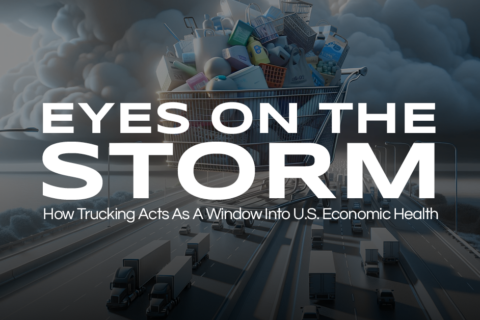Eyes on the Storm: How Trucking Acts As A Window Into U.S. Economic Health
Turmoil in the Trucking Industry How does the sudden closure of major trucking companies signal changes in the U.S. economy? Touted as a vital pulse-checker of the U.S. economy, the trucking industry has hit turbulent times, marked by the unexpected closure of major companies such as Yellow and Convoy. These abrupt shutdowns, affecting thousands of truckers, have exposed the industry’s fragility and its profound impact on the economy’s overall health. Rick McQuaide, a veteran freight company owner, underscores the worrying trend, linking it directly to the nation’s economic trajectory. His observations point to deeper systemic issues within the sector, reflecting a broader economic downturn. The Ripple Effect of Consumer Behavior According to McQuaide, a significant factor in the downturn is the shift in consumer spending patterns, initially inflated by government stimulus during COVID-19. This surge led to an increase in trucks on the roads to meet the heightened demand. However, as consumer spending began to decline, the trucking industry found itself grappling with an oversupply of trucks relative to available freight, leading to a significant reduction in rates and earnings for truckers. McQuaide’s company, for instance, has witnessed a 20% drop in rates compared to the previous year, highlighting the financial strain on the sector. Inflation and Operating Costs: A Double Whammy Compounding the industry’s struggles are inflation and escalating operating costs, the situation extends beyond trucking, affecting air freight and rail industries as well. McQuaide stresses the importance of recognizing these signs as indicators of broader economic health and consumer confidence. Consumer Spending: A Contradictory Picture While recent government data indicates a rise in consumer spending, McQuaide remains cautious. He notes that the shift in spending patterns, especially away from big-ticket items, mirrors the decreased activity in freight movement. This correlation serves as a warning signal for the U.S. economy, suggesting potential recessionary trends if consumer pullback continues. Trucking as an Economic Barometer The current state of the trucking industry transcends sectoral challenges; it’s a crucial indicator of the country’s economic direction. As McQuaide points out, the transportation of goods is intimately tied to consumer behavior and economic health. The industry’s slump is a clear sign of uncertainty and a shift in consumer spending habits, which could have far-reaching implications for the U.S. economy. Before You Go… Concluding our exploration of the trucking industry’s recent turbulence, it’s evident that this sector’s struggles are symptomatic of larger economic dynamics. The sudden closures of major trucking companies and the ensuing impact on thousands of truckers paint a broader picture of economic uncertainty and shifting consumer patterns. Rick McQuaide’s insights shed light on how these developments in the trucking world mirror changing consumer behaviors and potential recessionary trends. The trucking industry, often seen as the economy’s barometer, is signaling caution. This story is a stark reminder of the interconnectedness of various sectors and their collective influence on the national economy. We invite your thoughts and insights on this pivotal issue. What are your experiences and predictions for the trucking industry? Share your perspectives below in the comments section and stay tuned for more stories just like this in our next edition of Optimum Logistic’s weekly news recap. If you made it to this part of the article, we’d just like to take a moment to thank you for taking the time to read this news recap. Be safe out there and as always, If you’re in search of CDL A, B, or warehouse positions, check out our open positions. And if you need staffing solutions for commercial driving or industrial positions, be sure to explore our offerings.









Recent Comments